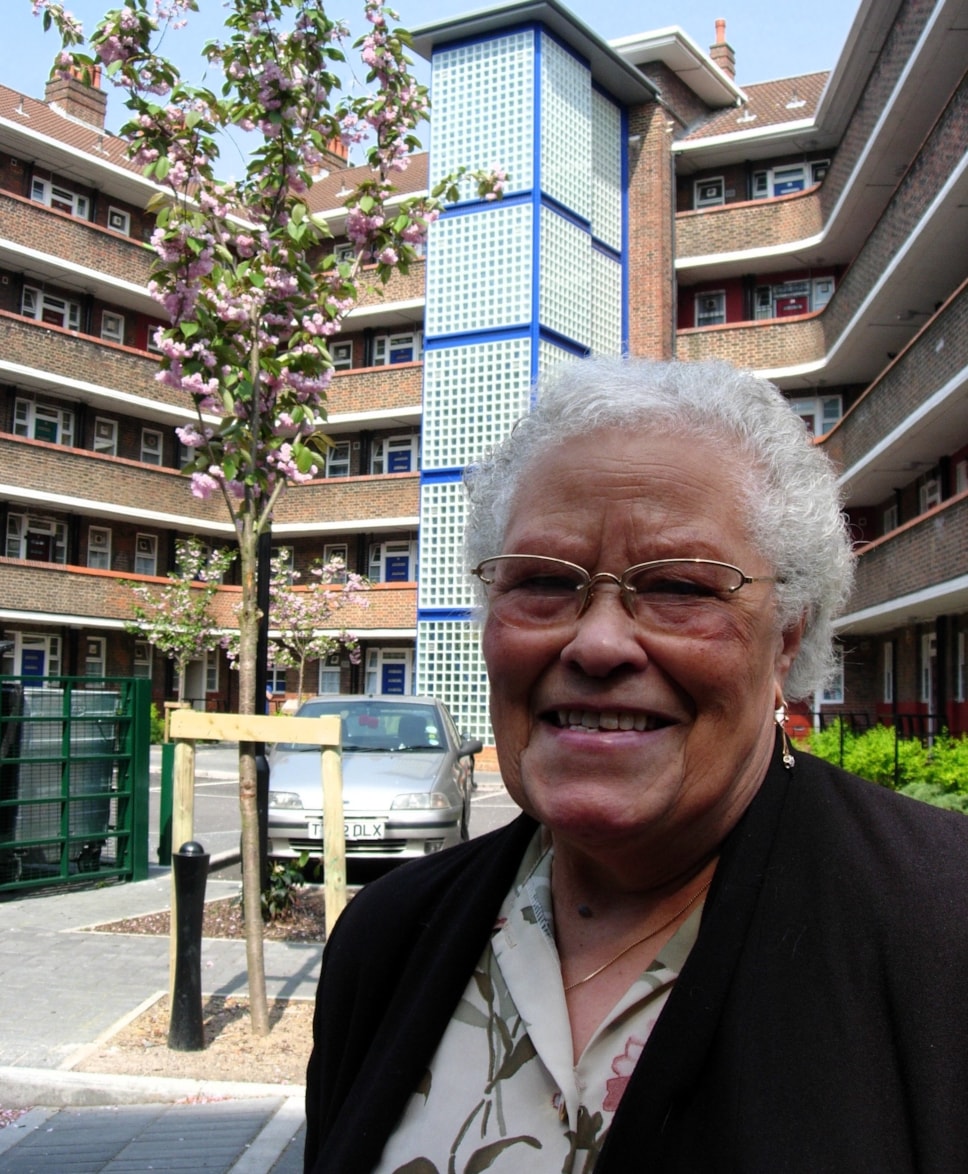
Community hero to replace name of slave profiteer at Homerton gardens
A public garden will be renamed after a community stalwart who spent six decades supporting her neighbours after a vote by local residents – the first place to receive a new name in Hackney Council’s Review, Rename, Reclaim project.
Kit Crowley Gardens will be the new name for the former Cassland Road Gardens after residents voted for the local role model from a shortlist of four. The decision was confirmed at last night’s Full Council meeting.
The move is part of a wider review of the names of local landmarks, streets, buildings and public spaces in Hackney to ensure they reflect the borough’s diverse history, as part of the Council’s anti-racism programme.
Kathleen ‘Kit’ Crowley was born in 1918 to an English mother and Barbadian father. Kit experienced poverty and racism, and growing up where survival often relied on the goodness of neighbours shaped her resilience and sense of community spirit.
When interviewed in 2013, Kit said: “You survived with each other… you shared, that's what it's all about, caring and sharing, no good keeping everything to yourself cause you can’t eat it all…”
Kit moved to the newly built Gascoyne Estate in 1948 as a newlywed where she and her husband raised their family. Kit lived there for 62 years, working at Wentworth Nursery for 32 years. She was described by those that nominated her as ‘a role model for children of the Windrush generation growing up in the area’.
Her name will replace Sir John Cass, director of the Royal African Company – an English slave trading company that trafficked enslaved Africans for profit in the late 17th Century. The former Cassland Road Gardens sign now lives in Hackney Museum as an educational artifact.
Nearly 650 people took part in the consultation to select the new name after signs bearing the previous name were removed in December 2020. A community steering group of local community leaders, cultural experts, historians, teachers and young people shortlisted four names of people who reflected Hackney’s African or African-Caribbean heritage and had links to the area, including nominations by local people. More than half of Cassland Road residents that voted chose Kit as the winner.
The Review, Rename, Reclaim project was set up in June 2020 to listen to the views of residents, partners and others about how to tackle public spaces named after slave and plantation owners. As well as Cass, the review is exploring three other contested figures:
- Francis Tyssen (1625-1699), absentee plantation owner who profited from an enslaved workforce, was a shareholder of the Royal African Company and was an active member in the East India Company
- Robert Geffrye (1613-1704), an East India merchant and shareholder of the Royal Afican Company, who directly profited from the trafficking of enslaved Africans
- Cecil John Rhodes (1853-1902), a British imperialist whose policies and practices have had a lasting negative effect on southern Africa
It is part of the Council’s anti-racism work in response to the Black Lives Matter movement, which also includes a groundbreaking black history curriculum in schools, and programmes to report the Council’s own ethnicity pay gap and make its leadership more inclusive.
Who was Kit Crowley?
Kit (1918-2018) was a beloved member of the local community and her name was voted for by local residents to be the new name of the gardens.
Kit’s father was from Barbados and her mother was English. She had a difficult childhood in a single parent household, surviving poverty and racial prejudice in nearby Bethnal Green.
In 1947 Kit married John Crowley shortly afterwards they moved into the newly built Gascoyne Estate. This estate provided spacious homes for those, like Kit, that had known only the cramped tenant housing. Kit was to live on this estate for 62 years before moving to the local care home.
Kit worked at the local Wentworth Nursery for 32 years. She knew the value of community spirit, and the importance of looking out for your neighbours. She was described as a role model for the children of the Windrush generation growing up on the Gascoyne Estate.
Who was Sir John Cass?
The gardens and surrounding areas were first developed by The Sir John Cass Foundation during the 1800s, a charity founded by the will of Sir John Cass (1660-1718). Cass was a politician, as well as an official of, and investor in the Royal African Company. This organisation was granted a monopoly over all English trade to West Africa in 1660.
Although trade began with ivory and gold in exchange for textiles and weapons, it soon became focused on the trafficking of enslaved people. Between 1662 and 1731, the Company transported approximately 212,000 enslaved people, of whom 44,000 died on route. Cass retained shares in the company until his death and, like all its investors, would have been fully aware of its activities and intended to profit from this exploitation.
Fifty, maybe sixty, years ago, a college sat close to these gardens – a college where my mother worked as a cleaner.
When the college made way for housing, it seemed the bricks had crushed the past. Now the past is restored. Her spirit will forever have this haven, free from dust and traffic, a place of peace and trees and flowers to rest and sit and smile.Kit's son John
Over the last year we’ve all been on a journey into Hackney’s sometimes hidden diverse history, and I’m proud that Kit Crowley Gardens will be the first place to be renamed in our review.
We believe that after the movement over the last year, it’s right that we all take the time to learn about the past and reflect on whether our public spaces best represent the communities that live here.
2020 will be remembered for a long time to come – the pandemic revealed the extent of inequalities across society. The shocking murder of George Floyd set off a chain reaction which has left the UK asking questions about our own history and structures. The reverberations and responses were visceral, genuine and heartfelt. If we fail to learn the lessons from 2020, we fail our communities.
In Hackney, we committed to reviewing the names of places and spaces – part of our longstanding anti-racism work. Changing the name of this garden is a start of our journey to ensuring public space reflects who we are and what we stand for – elevating those who have made a positive contribution to our borough while retaining the story of those whose names we are removing.Cllr Carole Williams, Cabinet Member with responsibility for Equalities
